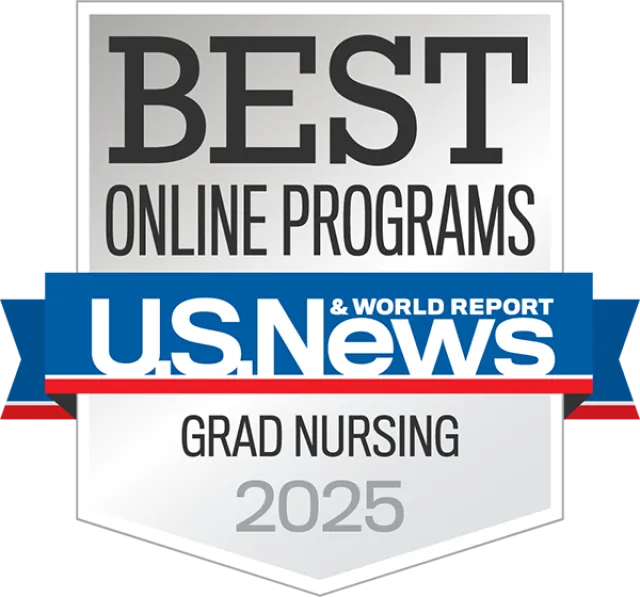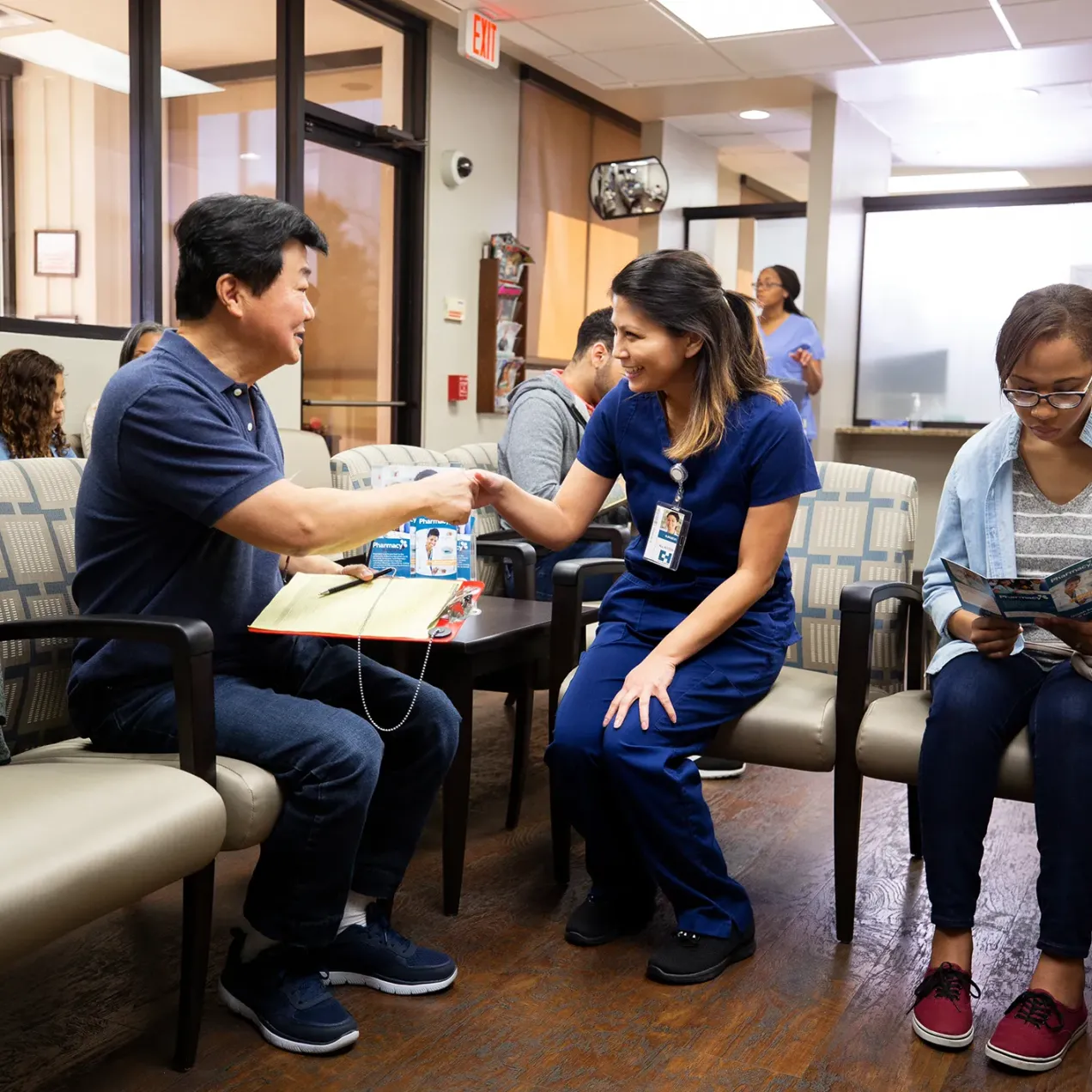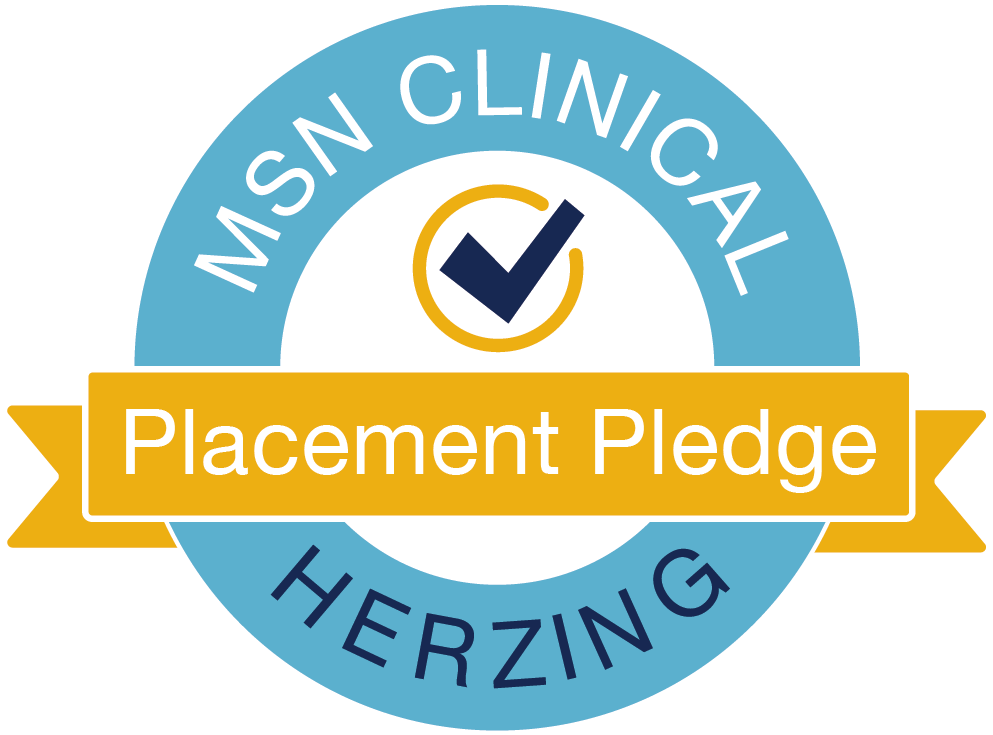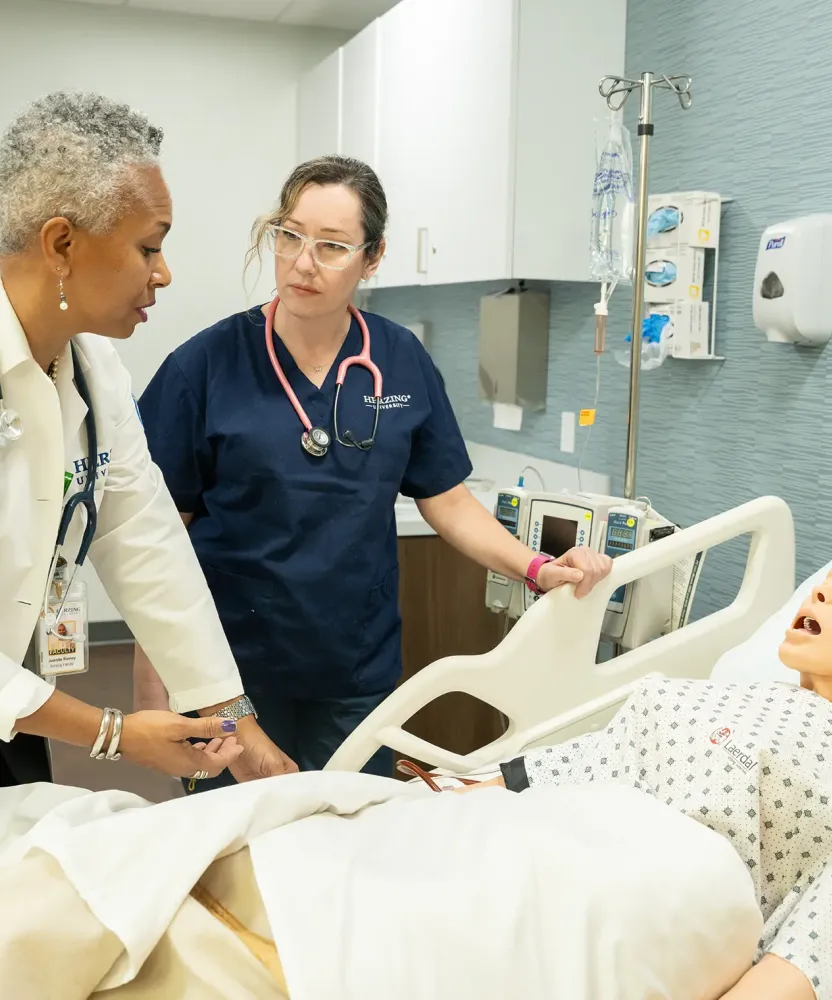Go from RN to MSN – Public Health Nursing with Herzing University
| Accreditation | CCNE accredited,1Accredited by the Higher Learning Commission |
|---|---|
| Choose your path | Choose our Accelerated RN to MSN curriculum, or stop for a BSN on the way (RN to BSN to MSN) |
| Format | 100% online coursework with hands-on clinical practicum experience |
| Paying for school | Scholarships and financial aid available for those who qualify; transfer approved credit from prior college coursework to reduce cost and time |
| Our pledge | We pledge your clinical placement! |
| Dual credit | Earn dual credit towards a Doctor of Nursing Practice (DNP) |
| QuickPaths | Transfer credit, stackable credentials, and adaptive learning technology build a faster pathway to a higher education with Herzing University |
Learn More Today!

Ranked by U.S. News & World Report as one of the best online graduate nursing programs in 2025
Overview: RN to MSN - Public Health Nursing
The RN to MSN – Public Health Nursing degree pathway is a 52-credit graduate program which prepares you for a career as a leader in public health nursing. The degree program provides students with fundamental knowledge and skills in community and public health nursing, dimensions of advanced nursing practice, advocacy and policy, health promotion, and much more.

Career-focused curriculum
Discover the crucial knowledge and skills required to succeed in your work and build a foundation for continued career growth.
Flexible schedule
We work hard to help you maintain school-life balance, striving to be as flexible as possible for busy non-traditional students.
Virtual services
Access to extensive virtual services, including academic advising, tutoring, support services, technical support and library services.
Lifelong support
We support your ongoing career advancement by providing comprehensive, personalized student services with lifelong career coaching.
Rolling admissions
No application deadlines to worry about. Apply when you’re ready and prepare to get started soon.
RN to MSN in Public Health Nursing courses & curriculum details
All didactic lecture-style courses are delivered 100% online. You will also be required to complete 180 clinical practicum hours.
You may also elect to earn a bachelor’s degree on the way as part of an RN to BSN to MSN pathway, which combines our RN to BSN (12 months) and MSN – Public Health Nursing (16 months) programs. Please contact admissions for more details.
| Program | Months i | Semester Credits |
|---|---|---|
| Master of Science in Nursing (MSN) in Public Health Nursing - Accelerated RN-MSN (MSNPHA) | 20 | 52 |
i. Average number of months for students to complete program. Program availability varies by location.
Required Bridge Courses
All courses, 16.00 semester credit hours, are required prior to completing graduate level coursework.
Required Core Courses
All courses, 15.00 semester credit hours, are required.
Required Direct Care Courses
All courses, 9.00 semester credit hours, are required.
Required Specialty Courses
All courses, 12.00 semester credit hours, are required.
Tuition & Cost
Tuition & Cost
The cost of tuition for the RN to MSN - Public Health Nursing program is $630 per credit.
You can potentially earn even greater savings by transferring credit from prior college coursework, applying for financial aid, or potential partnership opportunities through your employer.
Our goal is your career advancement. That’s why we are always working to improve our curriculum and processes to make our program as affordable as possible while preparing you best for success in your work.
Scholarships & Financial Aid
You may be eligible for multiple scholarships and grants—including our Nurses Circle of Achievement scholarship, which offers up to 10% tuition reduction.
Military/Veteran Discounts
Veterans, Active Duty U.S. Servicemembers, and spouses may qualify for a 10-20% tuition discount.
Admissions requirements
Enrollment requirements are the same whether you choose the Accelerated RN to MSN-PH or RN to BSN to MSN-PH track. Prerequisites include:
- Live in a state where Herzing University is authorized to offer the RN to MSN program
- Hold a current, active and unrestricted license as a registered nurse (RN) in the same state in which they practice
- Hold an associate degree (ADN/ASN/AASN) in nursing from a nationally or regionally accredited college or university
- Participate in an interview to identify your goals and determine if the program is right for you
Eligible states for enrollment: Alabama, Alaska, Arizona, Arkansas, California, Colorado, Connecticut, Delaware, Florida, Georgia, Hawaii, Idaho, Illinois, Indiana, Iowa, Kansas, Kentucky, Louisiana, Maine, Maryland, Massachusetts, Michigan, Minnesota, Mississippi, Missouri, Montana, Nebraska, Nevada, New Hampshire, New Jersey, New Mexico, North Carolina, North Dakota, Ohio, Oklahoma, Pennsylvania, Rhode Island, South Carolina, South Dakota, Tennessee, Texas, Utah, Vermont, Virginia, West Virginia, and Wisconsin.
Your clinical placement is our pledge.
We understand securing clinical placement as part of an RN to MSN - Public Health Nursing program is one of the biggest concerns students face. At Herzing, we offer guidance and support through our step-by-step Clinical Guidance Process to ensure you can get the clinical practice experiences you need.
As a Herzing student, we’ll encourage you to find your own preceptor and clinical sites as there are many benefits to doing so. However, we provide extensive support should you find difficulty along the way. With Herzing, you are never on your own.
Because of our strong relationships with healthcare providers across the U.S. and our comprehensive Clinical Guidance Process, we are confident in our ability to help you find clinical placement. So much so that if you are unable to find a clinical site on your own, we pledge to step in and help you secure clinical placement.*
* Subject to terms and conditions outlined in the enrollment documents.

Become a leader in public health nursing
You can begin shaping the way nursing is done by specializing in the field of public health nursing. Apply what you’ve learned and experienced as an RN to become a population health advocate, analyst, and decision-maker. You can become a health educator and coordinator of important medical and social services people need to stay healthy.
Instead of primarily treating illness and disease that has already occurred, you can work to prevent it in the first place.
Earning a master’s degree can help you build the knowledge and skills needed to climb the ranks and qualify for leadership and managerial positions in public health nursing.
Waived Enrollment Fee
Discover the educational pathway designed to maximize your career potential. Reach for greater heights with Herzing University.
Faq
Frequently Asked Questions
Didn't find the answer to your question? Send us an inquiry and we will be happy to answer all your questions!
After earning a master’s degree you may pursue further nursing credentials in a post-master’s certificate in nursing program. Herzing offers multiple certificate options with specializations in:
- Adult Gerontology Acute Care Nurse Practitioner (AGACNP)
- Adult Gerontology Primary Care Nurse Practitioner (AGNP/AGPCNP)
- Family Nurse Practitioner (FNP)
- Nursing Education (Nurse Educator - NE)
- Nursing Leadership & Administration (NLA)
- Pediatric Nurse Practitioner (PNP)
- Psychiatric Mental Health Nurse Practitioner (PMHNP)
- Public Health (PH)
- Women's Health Nurse Practitioner (WHNP)
After earning master's-level preparation in the specialty of your choosing, you can then advance to the doctorate level by enrolling in our online post master's DNP program.
Earning an MSN or DNP represents a huge step forward in your education, but there is always more to learn. We are your lifelong partner in learning, dedicated to helping you earn the education needed to reach your highest career goals.
A Public Health Nurse (PHN) can work in a variety of community-based roles. They assess, evaluate, and implement interventions to improve health systems and policies. Their work can involve smaller communities or larger public and global patient populations.
Some job responsibilities can include health education, case management, program planning, policy development, epidemiology and disease prevention, and much more.
Learn more about what public health nurses do, including examples of the different kinds of work you can do and the skills required for success in the field.
Public health nurse refers to a broad category of different types of nurses focused heavily on education and illness prevention. Common types of community and public health nurses include school nurse, maternal and child health nurse, occupational health nurse, and case management nurse.
PHNs with advanced education and experience can qualify to become a consultant or lead a team as a director or manager of a team of nurses.
One of the top certifications for public health professionals is the Certified in Public Health (CPH) certification from the National Board of Public Health Examiners (NBPHE). You’ll need a combination of education and experience to qualify to sit for the exam.1
You may not need to be certified to earn every type of job in public health nursing. However, CPH certification can separate your resume from the rest, and shows employers you’ve got the knowledge, skills, and experience to excel in the position.
1. You must meet specific eligibility criteria to sit for the CPH exam. The Herzing University MSN program in Public Health is not accredited by CEPH.
“Public” and “community” nursing are terms often used interchangeably—but they aren’t necessarily the same thing.
Community health nurses typically work directly with individuals, families, and groups to achieve better health outcomes.
Public health nurses usually take a broader approach to patient populations. They focus on advocating for change in systems, reforming policy, and health promotion.
In general—community health nurses directly help people make the best use of the systems in place, while public health nurses focus on improving those systems.
Of course, there are several factors behind why jobs are named the way they are. When you start looking for jobs in public health or community health nursing, be sure to thoroughly read through the job description to determine if it’s the right kind of role for your skillset and preferences.
It’s right in the name—the MSN in Public Health Nursing is a nursing degree designed for current RNs, while an MPH is designed for non-nursing professionals.
Enroll in an MSN in Public Health Nursing and you’ll take nursing specific courses covering topics such as technology and nursing informatics, research methods, evidence-based practice, pathophysiology, pharmacology, and much more. You’ll have the opportunity to pursue the public health track while continuing to advance your nursing knowledge and skills.
Salaries in the public health nursing specialty can vary widely depending on your education, experience, and state of employment.
In the case of your first entry-level nursing job in public health, you may not be required to advance your education to the master’s level to qualify. Registered nurses across all specialties earn an average salary of $89,010 per year ($42.80 per hour), according to the Bureau of Labor Statistics (BLS).*
Earning a master’s degree can help you qualify for upper-level managerial and leadership positions in public health nursing. The BLS reports the average salary for medical and health service managers is $127,980 per year ($61.53 per hour).*
Program Finder
RN to MSN - Public Health Nursing
OnlineTo learn more about this program, click the Request Info button.
The Student Experience at Herzing
With discipline, time management and dedication, you can always accomplish your goals -- never forget that!
Althea Brown
Nursing | Madison CampusI love Herzing University because they gave me the opportunity to further my education and reach my goal of becoming a registered nurse (RN).
Barbara Allen-Johnson
Nursing | Orlando CampusI’ve always wanted to play a larger role in patient care and positive health outcomes and now I finally get to!
Jacqueline Reid
Nursing | Online CampusWhat I liked most about my experience at Herzing University were the faculty members. They made it feel like it was family here.
Wanda Colon
Nursing | Orlando CampusMy advice for others is to never doubt that you can do it, because you can! I worked a 40+ hour job and completed this program. It will not be easy, but as long as you keep moving forward and take it day by day, you will be fine! I am proud to be a graduate from Herzing University.
Rasheta Tadesse
Nursing | Akron CampusAccreditation & Disclosures
1. The master's degree program in nursing at Herzing University Madison is accredited by the Commission on Collegiate Nursing Education (http://www.ccneaccreditation.org). Herzing University is approved to offer programs in an online learning modality through association with the main campus in Madison, Wisconsin.
Herzing University is accredited by the Higher Learning Commission (hlcommission.org), an institutional accreditation agency recognized by the U.S. Department of Education.
* BLS pay estimates calculate the median annual wage for various occupations. Per the BLS the median wage for an occupation is: "The wage at which half of the workers in the occupation earned more than that amount, and half earned less. Median wage data are from the BLS Occupational Employment and Wage Statistics survey." Bureau of Labor Statistics (BLS), U.S. Department of Labor, Occupational Outlook Handbook 2024. BLS median wage estimates do not represent entry-level wages and/or salaries. Multiple factors, including prior experience, age, geographic market in which you want to work, and degree level and field, will affect career outcomes, including starting salary and earnings as an experienced employee. Herzing neither represents that its graduates will earn the median salaries calculated by BLS for a particular job nor guarantees that graduation from its program will result in a job, promotion, particular wage or salary, or other career growth.
Recent Blog Posts
Waived Enrollment Fee
Discover the educational pathway designed to maximize your career potential. Reach for greater heights with Herzing University.






